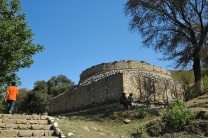No video yet

Jaulian
Jaulian (Urdu: جولیاں; meaning Seat of Saints) is a ruined Buddhist monastery dating from the 2nd century CE, located in Pakistan. Jaulian is located in Haripur District, Khyber Pakhtunkhwa province, near the provincial border with Punjab and the city of Taxila.
Jaulian, along with the nearby monastery at Mohra Muradu, form part of the Ruins of Taxila – a collection of excavations that were inscribed as a UNESCO World Heritage Site in 1980.
Location
Jaulian is located on a hill 100 metres above the nearby modern village of Jaulian. The cities of Rawalpindi and Islamabad are approximately 35 km and 45 km to the southeast, respectively and situated near Khanpur Taxila road; a picnic place near Khanpur Dam. Jaulian is located near the Mohra Muradu monastery, and the ancient Taxilan city of Sirsukh. Moreover, Piplan Remains, Badalpur Stupa and Jinnah Wali Dheri Stupa are nearby places.
History
Jaulian was built by the Kushans in the 2nd century CE – around the same time as the nearby Mohra Muradu Jaulian, along with the rest of Ancient Taxila, was devastated in the 450s CE during the invasion of the White Huns, and later abandoned. Subsequent rulers, such as the Hun King Mihirakula, persecuted the region's Buddhists, and the site never recovered.
Excavations
The ruins at Jaulian are situated on a hill top, and consist of: a main central stupa, 27 peripheral smaller stupas, 59 small chapels displaying scenes from the life of Buddha, and two quadrangles around which monastic living quarters were arranged. The form and building of Jaulian is similar to that of the nearby Mohra Muradu.
Main stupa
Remains of the main Stupa, and small peripheral StupasThe main stupa at Jaulian was much smaller than that of Mohra Muradu or the Dharmarajika Stupa, and is badly damaged. It was extensively coated in stucco plaster, as are almost all the sculptures and architectural details. Despite the use of an easily moldable material, the quality of decoration at Jaulian is considered to be less impressive than that of Mohra Muradu. The original plaster is preserved at some...






